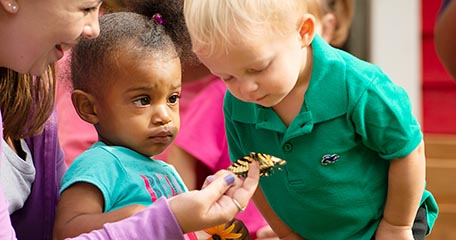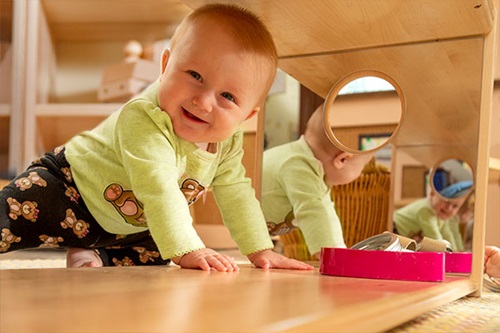The dual challenge
Meeting the needs of parents and babies
| June 2012Experienced caregivers who work with babies often list their relationships with the parents of those babies as both the most difficult and the most rewarding aspect of their work. It is in this relationship that the caregiver can most clearly see the impact of their work on society.
While working well with parents is important for all childcare providers, when you work with babies, the issue is different from childcare for older children. Parents of babies require much more direct, face-to-face communication as well as daily written communication. Babies can’t talk, after all. As important, therefore, as being able to work well with babies, is the caregiver’s ability to relate comfortably with adults. That is not a given in our field, where people may subconsciously choose this work because they are uncomfortable with adults.
What makes it even more complex is the emotional issue. So many parents today are very young and live far away from relatives who could otherwise lend support. Childcare people have, in effect, become the extended family for many parents. In that role we are often called upon to give advice and lend support.

What parents want
When parents are interviewed about why they chose a particular childcare situation, they start with the obvious. They want a clean, safe place and first check out programs recommended to them by friends. But always the deciding factor is their perception of the caregiver. They want not only someone who can care well for their baby, but also someone with whom they personally feel comfortable “This is more than a business relationship. I’m trusting this individual with the most precious thing in my life.” “I need to feel comfortable talking to the person who is caring for my baby – like I can express concerns and feel that she understands what I want for my child.”
One other interesting aspect of the relationship often emerges. The parent sometimes needs to feel nurtured herself. “When I entered this centre, I felt that they cared as much about me as they did about my baby.” “My caregiver is my best friend. She understands me. I always feel welcome here.” Parents also often mention a matter of personal style. “I want someone who will care for my baby and respond to him the way I would if I were home with him.” They are, in effect, looking for their “sister” as one mother put it.
The natural tension of the relationship
Although much has been written about the adjustment of babies to childcare, very little attention has been given to how it affects the parents. We are fighting instinct. Some mothers even report visceral distress when they leave their baby in childcare for the first time. Because the mother is often hurting when she must leave the baby, she may resent the baby’s subsequent healthy attachment to the childcare provider, putting the mother and the caregiver in competition. It takes a mature, sensitive, and empathetic caregiver to make both the baby and the parent feel comfortable with the arrangement.
Caregivers express that sometimes they feel like they can’t win. The parents feel terrible when the baby cries when he or she leaves in the morning, and the caregiver works and works to make the child feel comfortable and happy in the new situation. Finally the day comes when the baby does not cry but reaches eagerly toward the caregiver. The parent still feels terrible. “I’m losing my baby. She loves her caregiver more than me.” Even when the parent understands intellectually that it is healthy for the child to develop a strong attachment to the caregiver, it can be hard to accept emotionally. The caregiver must constantly reassure that the parent will always be number one with the child.
This can be hard to convince the parent of when the baby cries at the end of the day and does not seem to want to go with the parent. It can help to explain to the parent that what might be happening is what this writer calls The Miss America Syndrome. The contestant in the beauty contest holds herself together with poise, smiling constantly through all the competitions. When the crown is finally placed on her head, she often falls apart and cries. She’s safe now. The prize is hers. Likewise with the baby in childcare, he participates with the group all day and seems to be fine – and he is. When the parent shows up – the prize – he feels safe to let down and cry or be cranky. Many babies simply do not like transitions. Point out to the parent that it was the same child who cried in the morning because she did not want the parent to leave.
The reward for the caregiver will come when the parent finally says, “I’m so happy because I can go to work with peace of mind, knowing that my baby is happy here and loves you.” To say this, the parent must feel trust and respect.
Caregiver as expert
Another kind of problem can arise when people seem to abdicate their role as parents, regarding the caregiver as the all-knowing expert. They expect the caregiver to know all the solutions to any problem that arises with their child. It’s easy to see how this can happen. Even the most educated parents, successful and highly effective in their careers, can feel like helpless fools around a new baby or a strong-willed toddler. To them, the caregiver makes it look easy. And caregivers are often secretly pleased when parents ask for advice and happily tell the parent what to do. But this may not be what is best for the parent.
The wise caregiver will instead develop a sense of partnership with the parents, becoming the kind of expert that facilitates expertise in others. This caregiver emphasises that although he/she knows a lot about child development and has worked with many babies, the parent is the ultimate expert on that particular child. Lori McHale, a childcare provider in California, says, “I give my parents a lot of information in the form of articles from magazines, books, etc. and also share some of my experiences. But I make them decide what to do for their own child. I want to build their own sense of competence and confidence as a parent.”
Some centres have developed a voluntary parent support group. Parents come together on a regular basis and decide among themselves what they want to discuss. The caregiver participates as a facilitator, and equal participant, not as a leader.
On the other hand…
Sometimes caregivers wish parents would regard them as more of an expert. One caregiver reports: “The most difficult aspect of working with babies for me is wanting to be able to give advice to the parents but feeling like I am overstepping a certain boundary – especially with new parents who seem to feel offended that you would question their methods or ideas. I’ve tried several different ways of revealing my feelings to them but somehow there is always that awkward feeling.”
This caregiver may be misinterpreting defensiveness on the part of parents as lack of interest. A direct but gentle approach might work. “How do you feel about…?” “I’ve noticed…” “Have you ever thought about…” “You might try…” “Sometimes other parents have found this to be successful…” Again, it is useful to have articles or books to support you. Finding something in print that says the same thing you are recommending gives added validity to your point of view.
When problems and conflicts arise, “Seek first to understand and then to be understood.” Acknowledge the parent’s concern –rephrase it so they know you understand. If you have made a mistake, admit it and tell what you will do to resolve it. Work together to find a mutually satisfactory solution.
It all boils down to good communication
Programs for babies always have more paperwork than childcare for older children. Parents greatly appreciate the daily notes home detailing the child’s experiences during the day. Work also on developing comfortable social relationships with the parents, as adults. Social events in which parents can get to know each other as well as the caregiver in a relaxed, social arena can go a long way toward making people feel relaxed and comfortable with each other. If problems do arise, they will be easier to discuss.
Don’t forget the joy
Share with the parents the fun things that happen, the cute things the babies do and say. Help them notice the joy on the baby’s face when they arrive. Most of all, communicate your pleasure in working with this unique human being. It’s what makes working with babies an art.





